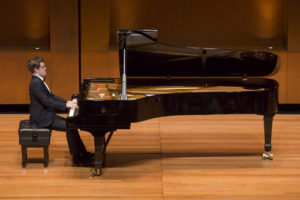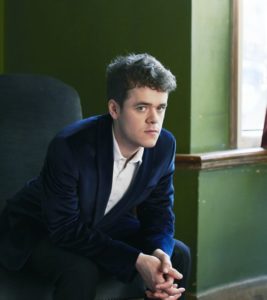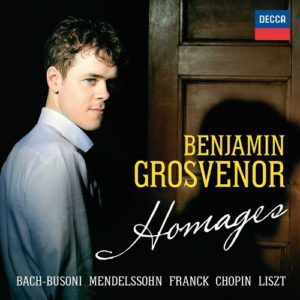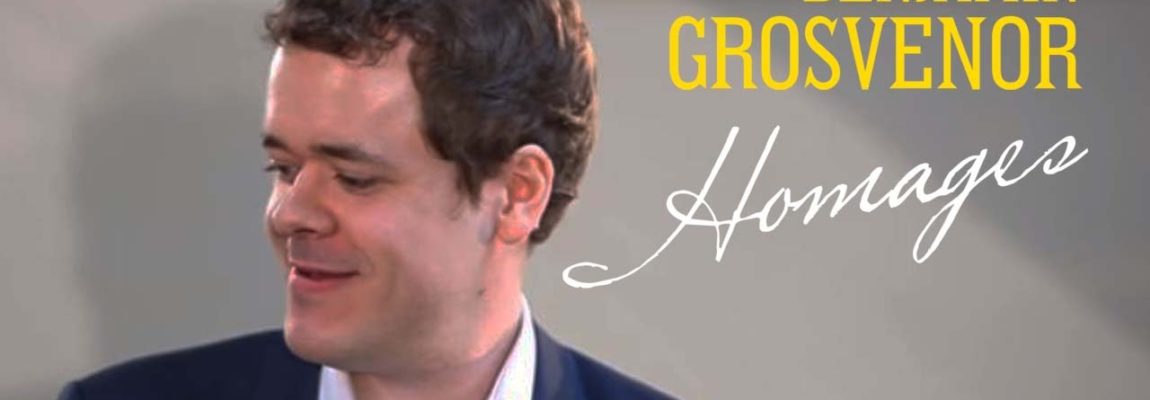British pianist Benjamin Grosvenor has been in the spotlight for over half of his lifetime, having won the BBC Young Musician of the Year in 2004 at the age of 11. He was already demonstrating profound maturity in his interpretations and command of the piano at that young age, and Grosvenor has continued to develop over the years. The first British pianist in 40 years to be signed to the Decca label, Grosvenor has now released four albums and continues to tour worldwide with solo recitals, chamber music collaborations, and concerto appearances. I’ve followed the pianist’s career with special interest, taking in both New York and Vancouver concerts in his 2017 North American Tour, having interviewed the pianist previously and having been commissioned to write the liner notes for Grosvenor’s third Decca CD (‘Dances’). This new interview brings us up to date on the artist’s current thoughts and preoccupations, and his recollection of his experiences growing up with so much acclaim. Benjamin Grosvenor has now made three Vancouver appearances with the Vancouver Recital Society; his debut concert was April 2013.
This interview first appeared on the Vancouver Classical Music website
I HAD THE PLEASURE OF INTERVIEWING YOU IN 2011, WHEN YOU HAD JUST TURNED 19 AND WERE ABOUT TO GIVE YOUR MUCH-ANTICIPATED OPENING CONCERT AT THE PROMS. YOU MUST HAVE GONE THROUGH A LOT BOTH PERSONALLY AND PROFESSIONALLY IN THE LAST 6 YEARS.
Yes, quite a lot has happened in that time, from completing my studies at the Royal Academy of Music to taking on things like the vexing responsibilities of home ownership. Professionally, I have had so many rewarding musical experiences and partnerships and I have learned a great deal from each one. I have also undertaken a lot of new repertoire. I’m sure that certain aspects of my musicianship have developed as a consequence although it is difficult for me to tell you the specifics of this process.
MUCH WAS MADE OF THAT PROMS DEBUT AND THE FACT THAT YOU WERE THE FIRST BRITISH PIANIST SIGNED TO DECCA FOR SEVERAL DECADES. HOW HAVE YOU ADAPTED TO BEING A HIGH-PROFILE ARTIST IN YOUR NATIVE COUNTRY? IS YOUR EXPERIENCE DIFFERENT AT HOME THAN ABROAD?
In some ways, the nature of the coverage I receive in the UK can be a little trickier to deal with: the fact that I’ve been receiving media attention since I was 11 can mean that local journalists and some in the music business approach me based upon things that I did many years ago. Of course, I’m fortunate to be receiving attention at all, yet I do think it is refreshing to perform in countries where there are no baked-in preconceptions about having been perceived as a prodigy playing a certain range of works. The two things I most appreciate about playing ‘at home’ are, first, not having to go through the stresses of airports and delayed flights to get to a venue and, second, the opportunity to play with orchestras and conductors with whom I’ve established a musical bond over time. For example, I enjoyed greatly a tour I made last autumn with the Hallé Orchestra and Sir Mark Elder playing the two Liszt Concerti. I learned a lot from that collaboration and Elder is an ideal, generous partner.

Photo by Juan Diego Castillo, Teatro Mayor Bogotá
YOU HAVE NOW GIVEN A GREAT MANY CONCERTS ALL OVER THE WORLD. DO YOU THINK YOUR WAY OF PREPARING FOR A PERFORMANCE HAS CHANGED?
In terms of musical approach, this will sound horribly boring, but I don’t plan the process of preparation differently now than I did ten years ago. I simply try to be as well prepared as I can. The major difference is that achieving this goal now takes considerably more coordination because I’m playing a lot more concerts and repertoire. Specifically, each season will usually involve 3-5 concerti plus one and a half recital programs plus chamber repertoire, as well as time for preparing new solo and concerted works. I’ve had to learn to try to use practice and preparation time as efficiently as possible.
YOUR TRAVELS HAVE OBVIOUSLY BROUGHT YOU TO A LOT OF DIFFERENT PIANOS AND HALLS. WHAT DO YOU HAVE TO DO TO ADAPT TO EACH INSTRUMENT AND PERFORMANCE SETTING?
I was always fussy about pianos and this has only grown with the years. I do have a particular sense of the texture and colour of sound that I’m seeking in each passage, as well as the overall dynamic range that I think is right for the acoustic. Of course, changes to tone can be improvised depending upon the character of a given instrument, and I might actually discover things through being forced to make adjustments on what seems to be, at first, an unfriendly instrument. But the real problem comes with those pianos that simply don’t have much capacity for colour or a grotty action. Experiences like this come with the trade, and I’ve had years of dealing with such situations. I’d like to think that I’m getting better at soldiering on through, but it doesn’t get any less frustrating.
HOW DO YOU GO ABOUT SELECTING YOUR REPERTOIRE? ARE THERE SOME WORKS THAT YOU ARE EXPLORING NOW THAT YOU HAD WAITED ON EARLIER?
I’ve always enjoyed eclectic programmes and, within that overall approach, try to set myself some challenges. This season, for example, I’m playing the Berg Sonata. I’d loved Berg’s music since playing some of the Seven Early Songs in a chamber concert when I was a student. I’ve read through his violin concerto a couple of times with a friend who was performing it but, apart from these two experiences, I haven’t played any music from the Second Viennese School. I had felt rather little affinity with Prokofiev until about two years ago, but now I’d like to play one of the concerti and one or more of the sonatas in a future season.

EARLIER GENERATIONS OF ARTISTS PRIOR TO THE DEVELOPMENT OF RECORDING TECHNOLOGY LEARNED THE MUSIC FROM THE SCORE FIRST. HOW DO YOU APPROACH NEW WORKS THAT YOU WERE FIRST EXPOSED TO THROUGH RECORDINGS OR CONCERTS?
It can be awkward if one has a particular performance of a work already imprinted in the mind, but there is really no way to prepare a new piece other than via first principles, which means beginning with the score, and also comparing different editions and Urtexts. In fact, when something like this has happened with me, I have usually found that a detailed study of the score prompts possibilities different from those of, say, a ‘favourite’ recording. And that launches me on thinking about the piece in my own way.
WE HAVE PREVIOUSLY DISCUSSED THE VALUE OF STUDYING HISTORICAL RECORDINGS BY THE GREAT PIANISTS OF THE PAST. DO YOU THINK PIANISTS TODAY STILL HAVE A LOT TO LEARN FROM THEM?
I do feel that there is a great deal to learn from historical recordings. And pianists should listen not only to recordings of historical pianists, but to conductors, violinists, singers… There are a great many current artists who I admire too, but I wish I currently had more time for listening in general – hearing recordings and, particularly, attending concerts – but generally I’m so busy now that listening time is limited.
 YOU RECENTLY RELEASED YOUR FOURTH ALBUM ON DECCA – A SOLO DISC THEMED AROUND ‘HOMAGES’ – AND WE ARE ALL ANTICIPATING NEW RECORDINGS FROM YOU. CAN YOU GIVE US A HINT OF WHAT’S NEXT?
YOU RECENTLY RELEASED YOUR FOURTH ALBUM ON DECCA – A SOLO DISC THEMED AROUND ‘HOMAGES’ – AND WE ARE ALL ANTICIPATING NEW RECORDINGS FROM YOU. CAN YOU GIVE US A HINT OF WHAT’S NEXT?
I prefer not to make a recording until I’ve reached a robust level of confidence in the repertoire, which will nearly always mean plenty of concert outings first. I’m currently in discussions with Decca about the next disc. They’d like a concerto recording, but that does involve a lot of coordination with venue, orchestra, and conductor. Unfortunately, I can’t give any further details simply because there aren’t any at this point!
IN CLOSING, WHAT WOULD YOU REGARD AS THE MOST UNIQUE (STRANGE, HUMOROUS, WONDERFUL) PERFORMING EXPERIENCE YOU HAVE HAD THUS FAR?
I think that often the more entertaining, or at least unusual, stories are when things don’t quite go as smoothly as planned. I can think of a few such stories – from fainting double bassists to tactless Sicilian photographers – but there is not one that is quite golden enough to set down into words yet. I have to say that some of the most wonderful performing experiences have been at the BBC Proms. The atmosphere there is really something so unique. I’ve recently had fantastic experiences in parts of the world that I had not previously visited. I have fond memories of visiting Brazil when I was thirteen and I was able to undertake a longer tour of South America this year. I was struck by the warmth of the audiences and the charming people I met there.
© Mark Ainley 2017
Photo Credits: Patrick Allen, Juan Diego Castillo, Sophie Wright
